Benefits of Using Logistics Companies in Kabul for Import and Export
The global business landscape is increasingly interconnected, and the movement of goods across borders has never been more important. In Afghanistan, the capital city, Kabul, plays a crucial role in the import and export industry. This is where Logistics Companies in Kabul come in, providing invaluable services that facilitate smoother trade and operations for businesses engaged in both domestic and international transactions. Here, we explore the key benefits of partnering with logistics companies in Kabul for your import and export needs.
1. Efficient Supply Chain Management
One of the primary benefits of working with Logistics
Companies in Kabul is their expertise in supply chain management. These
companies specialize in overseeing the entire process of moving goods from one
point to another, whether it's from a local supplier to a foreign buyer or vice
versa. They ensure that goods are transported efficiently and safely, reducing
the chances of delays, damage, or lost shipments.
Logistics providers manage various aspects of the supply
chain, including warehousing, inventory management, and the distribution of
products. This allows businesses to focus on their core operations while
relying on the logistics company to streamline the supply chain.
2. Expertise in Customs and Regulatory Compliance
Navigating customs regulations and ensuring compliance with
import-export laws can be a complicated and time-consuming process. Logistics
Companies in Kabul have a deep understanding of Afghanistan’s
customs policies and international trade regulations, making them an essential
partner for businesses that want to avoid delays, fines, or legal issues.
These companies are well-versed in handling the
documentation, tariffs, taxes, and legal procedures required for both exporting
and importing goods. With their assistance, businesses can be confident that
their shipments are fully compliant with both Afghan regulations and the laws
of the destination country.
3. Cost-Effectiveness
While logistics services can seem like an additional
expense, partnering with a reputable logistics company in Kabul can actually
save businesses money in the long run. These companies have established
relationships with carriers, freight forwarders, and local authorities, which
often enables them to negotiate lower shipping rates. Additionally, logistics
companies can help businesses optimize their shipping processes by
consolidating shipments and choosing the most efficient routes, reducing
unnecessary costs.
For businesses that are just starting to explore the
import-export sector, partnering with a logistics company in Kabul can also
help avoid costly mistakes that come from a lack of experience.
4. Risk Mitigation and Insurance
Every import and export transaction comes with risks,
including the possibility of goods being damaged, lost, or delayed during
transit. Logistics Companies in Kabul mitigate these risks by offering
comprehensive insurance policies for shipments. This ensures that in the event
of an unexpected incident, businesses can recover financially.
In addition, logistics companies implement risk management
strategies such as tracking systems, real-time monitoring, and contingency
planning, helping businesses to respond promptly to unforeseen disruptions.
This level of risk mitigation is particularly important in Afghanistan, where
political instability and infrastructure challenges can sometimes affect the
movement of goods.
5. Improved Time Management
Time is a critical factor in international trade. Delays in
transportation can lead to lost opportunities, unhappy customers, and damaged
relationships. By working with Logistics Companies in Kabul, businesses
can significantly reduce transportation and delivery time. These companies are
adept at planning the most efficient routes, managing freight schedules, and
anticipating potential delays, thus ensuring timely delivery.
In addition to this, logistics providers typically have
access to a global network of transport options—road, air, and sea—allowing
businesses to choose the most appropriate shipping methods based on urgency,
cost, and product type.
6. Customized Solutions for Specific Needs
Every business has unique needs when it comes to logistics,
and one-size-fits-all solutions often don't work well. Logistics Companies
in Kabul offer tailored services that can be customized to meet the
specific requirements of your import or export business. Whether you need
temperature-controlled transport for perishable goods, specialized handling for
fragile items, or bulk shipping solutions, logistics companies can create a
logistics strategy that works for you.
This personalized approach ensures that businesses receive
the most suitable service, which can improve operational efficiency and
customer satisfaction.
7. Improved Customer Satisfaction
Partnering with a logistics company helps improve the
overall customer experience by ensuring that goods arrive in a timely manner
and in good condition. A reliable logistics provider in Kabul guarantees that
businesses can fulfill their customer orders accurately and quickly. This
enhances customer satisfaction and fosters long-term business relationships.
A smooth logistics process reflects positively on the
company’s reputation, and happy customers are more likely to return for future
transactions, helping businesses grow and expand their market reach.
Conclusion
For businesses involved in import and export operations,
partnering with Logistics Companies in Kabul offers numerous benefits,
from improved efficiency and cost savings to enhanced customer satisfaction and
risk mitigation. These companies bring a wealth of experience and local
knowledge, which are invaluable in overcoming the challenges of international
trade in Afghanistan. By leveraging their expertise, businesses can ensure that
their goods are transported seamlessly, on time, and in compliance with all
relevant regulations.




Comments
Post a Comment